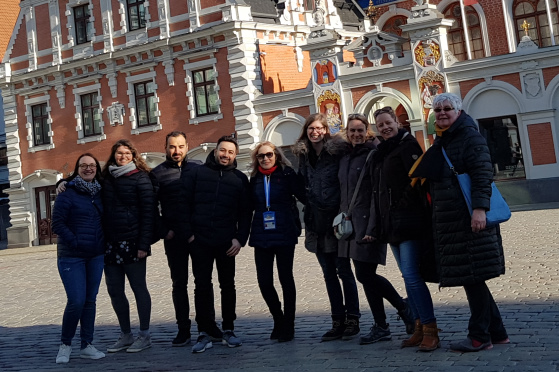Module 4: Mobility for guidance practitioners
| Site: | Euroguidance Latvia Academy |
| Course: | Resource library on mobility guidance |
| Book: | Module 4: Mobility for guidance practitioners |
| Printed by: | Guest user |
| Date: | Wednesday, 28 January 2026, 11:07 PM |
Description
EXPECTED LEARNING OUTCOME: You will be able to analyse the options for increasing competence and networking through learning mobility and formulate arguments for your personal mobility.
1. Face-to-face seminars, courses and study visits
 Guidance counsellors can participate in learning mobility, generally referred to as staff mobility, if the organisation they work for has signed respective agreements to participate in such international learning and exchange activities. Guidance counsellors are welcome to check with their institutions whether they are participating in any international project or activity, which envisages learning or experience exchange opportunities.
Guidance counsellors can participate in learning mobility, generally referred to as staff mobility, if the organisation they work for has signed respective agreements to participate in such international learning and exchange activities. Guidance counsellors are welcome to check with their institutions whether they are participating in any international project or activity, which envisages learning or experience exchange opportunities.
1.1. Euroguidance events and study visits
Euroguidance centres organise and invite guidance counsellors to events and study visits. These events are advertised on the Euroguidance website well in advance and counsellors are encouraged to apply. If you subscribe to the Euroguidance newsletter, you will get notification on upcoming events which might be of interest to you (please find a link at the bottom of https://www.euroguidance.eu).
**
1.2. Euroguidance Cross Border Seminars
 Euroguidance Cross Border Seminars (CBS) enable European guidance counsellors and experts to exchange professional experiences and serve as a basis for networking with each other. The main objective of CBS for guidance practitioners is to provide them with insights in a wide range of topics in the area of career guidance. The CBS, as a peer learning activity, aims to enhance networking and cooperation at the European level in matters of information and lifelong guidance, as well as to foster the exchange of good practices and methods among the participants. The seminars are recognised as examples of best practice by the European Commission and therefore will continue to be a constant and evolving part of the Euroguidance network’s activities. The CBS working group has evolved over time and currently includes 12 countries which are Austria, Croatia, Czech Republic, Germany, Hungary, Latvia, Poland, Romania, Serbia, Slovakia, Slovenia and Portugal. The number of members has grown over the years, and with an ongoing discussion on further expanding it.
Euroguidance Cross Border Seminars (CBS) enable European guidance counsellors and experts to exchange professional experiences and serve as a basis for networking with each other. The main objective of CBS for guidance practitioners is to provide them with insights in a wide range of topics in the area of career guidance. The CBS, as a peer learning activity, aims to enhance networking and cooperation at the European level in matters of information and lifelong guidance, as well as to foster the exchange of good practices and methods among the participants. The seminars are recognised as examples of best practice by the European Commission and therefore will continue to be a constant and evolving part of the Euroguidance network’s activities. The CBS working group has evolved over time and currently includes 12 countries which are Austria, Croatia, Czech Republic, Germany, Hungary, Latvia, Poland, Romania, Serbia, Slovakia, Slovenia and Portugal. The number of members has grown over the years, and with an ongoing discussion on further expanding it.
**
1.3. Academia exchange
 The Academia exchange is a European initiative that gives guidance professionals the opportunity to participate in a learning mobility period in another European country. Academia coordinators are engaged in sending their own guidance counsellors abroad and receiving practitioners from other countries on thematic study visits for a duration of 3 days to one week. The Academia project was launched in 1995 and since then hundreds of guidance practitioners in Europe have benefited from it. Thereby this project has contributed to strengthening the European dimension in guidance by building networks and promoting mobility and professional training. The Academia project promotes the mobility of guidance practitioners in Europe, enhances European networking and cooperation in matters of information and lifelong guidance, and fosters the exchange of good practices and methods among the participants. Academia gives guidance professionals an opportunity to participate in a learning mobility period in another European country.
The Academia exchange is a European initiative that gives guidance professionals the opportunity to participate in a learning mobility period in another European country. Academia coordinators are engaged in sending their own guidance counsellors abroad and receiving practitioners from other countries on thematic study visits for a duration of 3 days to one week. The Academia project was launched in 1995 and since then hundreds of guidance practitioners in Europe have benefited from it. Thereby this project has contributed to strengthening the European dimension in guidance by building networks and promoting mobility and professional training. The Academia project promotes the mobility of guidance practitioners in Europe, enhances European networking and cooperation in matters of information and lifelong guidance, and fosters the exchange of good practices and methods among the participants. Academia gives guidance professionals an opportunity to participate in a learning mobility period in another European country.
Watch a video about Euroguidance Academia learning mobility in Estonia 2019
**
1.4. Erasmus+ support opportunities
 Currently, there are several mobility opportunities available for guidance counsellors within the Erasmus+ programme.
Currently, there are several mobility opportunities available for guidance counsellors within the Erasmus+ programme.
“Job shadowing” means a kind of internship service where one is trained by a colleague in another country by working alongside them and monitoring everything he or she does. A job shadowing period can be between two days and two weeks within the framework of an Erasmus + mobility project. For staff in school, adult education and higher education, job shadowing can be done at the corresponding educational institution or at another relevant organisation. Vocational training can also be practiced within a company.
Training and Cooperation Activities (TCA) encompass a range of events, seminars and workshops, which enable Erasmus+ National Agencies to collaborate and share best practice across Europe. The overall aim of the activities is to improve the quality and impact of the programme at a systemic level. When planning a TCA, National Agencies refer to the objectives set out in strategic documents such as Europe 2020 and the EU Youth Strategy. In recent years, several TCAs with a specific guidance focus have been offered.
The Erasmus+ strategic partnership projects envisage staff mobility activities in the form of short-term joint staff training events, which gives the opportunity for respective institution’s support staff (also school career counsellors) to participate in learning and experience exchange activities. The duration of short-term joint staff training events usually is three days to two months; excluding travel days.
**
1.5. Teachers without borders
Teachers Without Borders is an international organisation launched in 2000 with a mission to connect teachers to information and each other in order to close the education divide and based upon the premise that teachers are community change agents and key catalysts of global development priorities. Teachers without Borders provides volunteering opportunities for both teachers and career counsellors in developing countries for 3 to 12 months. The aim of the projects is to improve the quality of education and pedagogical knowledge in developing countries.
**
1.6. Nordplus Junior programme
 The Nordplus Junior programme makes it possible to apply for grants for cooperation with schools in the Nordic and Baltic countries. It also provides the opportunity for teacher exchanges and exchanges of educational/academic staff.
The Nordplus Junior programme makes it possible to apply for grants for cooperation with schools in the Nordic and Baltic countries. It also provides the opportunity for teacher exchanges and exchanges of educational/academic staff.
As an example of such a project, the Swedish/Norwegian/Danish project “Nordic Changemaker Schools accept the UN global goals challenge“. Further information about the project can be found here https://www.nordplusonline.org/project_articles/nordplus-project-turned-upper-secondary-students-into-climate-activists/
**
2. Virtual possibilities
Euroguidance
Euroguidance centres can serve as a resource for information and consultation on guidance systems, policies and practice, as well as learning opportunities in Europe. The Euroguidance centres organise webinars on current topics in guidance within Europe and internationally to promote exchange of good practices.Erasmus+ Virtual Exchange
Since 2018, the Erasmus+ Virtual Exchange initiative offers intercultural learning experiences between young people in Europe and the Southern Mediterranean countries.eTwinning
eTwinning offers a platform for staff (teachers, head teachers, librarians, etc.), working in a school in one of the European countries involved, to communicate, collaborate, develop projects, share and, in short, feel and be part of the most exciting learning community in Europe.
School Education Gateway
School Education Gateway is an online platform for teachers, school leaders, researchers, teacher educators, policymakers and other professionals working in school education – including Early Childhood Education and Care (ECEC) and Vocational Education and Training (VET).
European Platform for Adult Learning
European Platform for Adult Learning (EPALE) is a European, multilingual, open membership community of adult learning professionals, including adult educators and trainers, guidance and support staff, researchers and academics, and policymakers. By supporting and strengthening the adult learning professions, EPALE enables members to connect with and learn from colleagues across Europe, through its blog posts, forums, the Partner Search tool, complemented with physical gatherings.
**
3. International Guidance Networks
 There are several international networks available for professional development of guidance counsellors.
There are several international networks available for professional development of guidance counsellors.
The International Association for Educational and Vocational Guidance
The International Association for Educational and Vocational Guidance (IAEVG) provides global leadership in and advocates for guidance by promoting ethical, socially just, and best practices throughout the world so that educational and vocational guidance and counselling is available to all citizens from competent and qualified practitioners. IAEVG organizes international conferences and webinars. It also publishes the International Journal for Educational and Vocational Guidance.
CareersNet
CareersNet is a network established by the European Centre for the Development of Vocational Training, also known as Cedefop. The members of CareersNet are independent experts in the area of lifelong guidance and career development. They are selected based on a call for experts, subject to an evaluation process and are nominated by Cedefop’s management. The work of CareersNet involves collecting data on policies and practices in career guidance to support transfer of good practices, creation of Cedefop's guidance tools, and development of national policies.
The Network for Innovation in Career Guidance and Counselling in Europe
The Network for Innovation in Career Guidance and Counselling in Europe (the NICE network) organizes summer schools for PhD students called ECADOC as well as autumn training workshops called “NICE Academy” which might be of interest to those who study, carry out research, as well as for practitioners.
VALA network
The Nordplus funded VALA is a network of higher education institutions, in the Nordic and Baltic countries and focuses on academic training in the field of lifelong guidance. Partner institutions have established the network to be able to better prepare career counsellors and guidance workers for the diverse clients they work with. The broad aim of the network is to increase professionalization and strengthen co-operation between higher education institutions and the labour market, and between research, practice and policy. The VALA network also organizes a summer school for guidance
practitioners on various themes.
**
4. MODULE 4: KEY POINTS TO REMEMBER

Face-to-face seminars, courses and study visits
- Guidance counsellors can participate in learning mobility, generally referred to as staff mobility, if the organisation they work for has signed respective agreements to participate in such international learning and exchange activities.
- Euroguidance centres organise and invite guidance counsellors to events and study visits. Information on these activities is published in the Euroguidance website and newsletter.
- Euroguidance Cross Border Seminars (CBS) enable European guidance counsellors and experts to exchange professional experiences and serve as a basis for networking with each other. CBS are a peer learning activity.
- The Academia exchange is a European initiative that gives guidance professionals the opportunity to participate in a learning mobility period in another European country.
- Currently, there are several mobility opportunities available for guidance counsellors within the Erasmus+ programme, including “Job shadowing” and participation in Training and Cooperation Activities (TCA).
- Teachers Without Borders provides volunteering opportunities in developing countries for 3-12 months.
- Nordplus Junior provides the opportunity for exchanges of teachers and educational staff.
Virtual possibilities
- There are various virtual possibilities offering mobility information and opportunities: Euroguidance centres, Erasmus+ Virtual Exchange, e-Twinning, School Education Gateway and EPALE.
International guidance networks
- There are several international networks available for professional development of guidance counsellors, among them the IAEVG, CareersNet, NICE and VALA.
